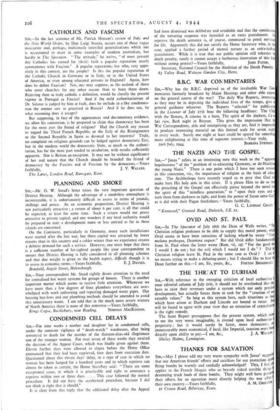CONDEMNED CELL DELAYS
Sta,—For nine weeks a mother and daughter lay in condemned cells, under the constant vigilance of " death-watch" wardresses, after being sentenced to death for the murder of the thirteen-days-old illegitimate son of the younger woman. For over seven of these weeks they awaited the decision of the Appeal Court, which was finally given against them. Eleven further days were allowed to elapse before the Home Office announced that they had been reprieved, four days from execution date. Questioned about this eleven days' delay, in a type of case in which no woman has been hanged for a hundred years and in which reprieve can almost be taken as certain, the Home Secretary said: "There are some exceptional cases, in which it is practicable and right to announce a reprieve within two or three days. . . . This case followed the normal procedure. It did not have the accelerated procedure, because I did not think it right that it should."
It is clear from this reply that the additional delay after the Appeal
had been dismissed was delibeiate and avoidable and that the continti- of the torturing suspense was intended as an extra punishment. reprieve the death sentence is, of course, commuted to penal servit. for life. Apparently this did not satisfy the Home Secretary who, in ...- case, applied a further period of mental torture as an extra-judi, punishment. While it is true that our public opinion still tolerates death penalty, surely it cannot accept a barbarous innovation of this I:, without strong protest?—Yours faithfully, JOHN PATON, Secretary, National Council for the Abolition of the Death Penalty. 63 Valley Road, Welwyn Garden City, Hens.


























 Previous page
Previous page